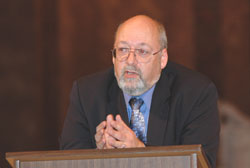Cathedral lecture series features national speakers
U.S. bishops’ pro-life official says life must be protected at all ages

Richard Doerflinger spoke recently in the archdiocese.
By Mary Ann Wyand
The human embryo is a developing person—no matter how small—and must be protected, Richard Doerflinger emphasized, but many scientists and politicians deny that basic truth about life because they think embryonic stem-cell research will discover cures for diseases.
Embryonic stem-cell research destroys developing embryos and hasn’t cured any diseases, he said, but researchers have successfully used stem cells from umbilical cord blood and amniotic fluid in the womb for therapeutic medical treatments.
Doerflinger, the deputy director of the U.S. Conference of Catholic Bishops’ Secretariat for Pro-Life Activities, was the keynote speaker for SS. Peter and Paul Cathedral Parish’s first Centennial Lecture Series program on Jan. 18 held in observance of the cathedral’s 100th anniversary.
“It was almost 12 years ago that Pope John Paul II issued his encyclical on the Gospel of Life,” Doerflinger said. “He warned then that—despite all our technical progress and our image of ourselves as caring, enlightened people who support human rights—we are well on our way to embracing what he called the culture of death, a culture where human life is cheap and the powerful wage war against the weak and vulnerable.”
In that encyclical, he explained, the pope said that, “If we fail to defend the right to life itself at its beginning and at its end and at its weakest, most vulnerable points in between, we will undermine respect for human rights in general.”
The U.S. Supreme Court did exactly that 34 years ago, Doerflinger said, in its
Roe v. Wade decision legalizing abortion during all nine months of pregnancy.
He said embryonic stem-cell research has renewed the moral debate between religion and science—faith and reason—about what constitutes a “real” person.
“The argument goes [that] the Catholic faith says that human life begins at conception with the embryo,” Doerflinger said. “Science, on the other hand, says that [medical] progress depends on being able to manipulate that embryo to provide life-saving stem cells to treat terrible diseases in human beings.”
Other types of stem cells offer effective treatment options, he said, and developing embryos should never be killed.
Sadly, Doerflinger said, the common definition of personhood as having cognitive ability and being able to survive without the help of others excludes the very old, the very frail, the handicapped and even the newborn child.
“It’s all very subjective,” he said. “Everybody has their own standard for where the line is drawn. … People [are] simply denying that other [stem cell] treatments exist and that thousands of people have been helped by those treatments, denying that other solutions exist, denying that the facts are the facts. So this [stem cell debate] is not about when life begins. It’s about … who’s got the power [and] who’s in charge.”
Embryonic stem-cell research uses human beings as a means to an end, Doerflinger said, which is morally wrong.
That ethical argument extends to end-of-life issues, he said. “Nobody doubts that terminally ill patients are human beings. … This [culture of death campaign for assisted suicide] is really about freedom of choice and people’s ability to choose their death.”
Terminally ill patients struggle with feelings of alienation, loneliness and isolation, he said, and they need love and support during their final days instead of encouragement to die quickly.
Like other culture of death issues, Doerflinger said, the argument about freedom of choice for assisted suicide and abortion “seems to be about making distinctions between the people who matter and the people who don’t.”
Pro-life efforts to end legalized abortion must continue more than three decades later, he said, because abortion proponents have successfully used “semantic subterfuge to get people used to the idea and … to deny the fact that everybody really knows that life begins at conception. … Just like with embryo research, they first decided what they wanted to do and then decided what they had to say about when life begins in order to do it. … Subtly, [abortion] has stopped being about ‘freedom of choice’ and now has become about ‘access.’ ”
The mentality of the culture of death begins with the loss of faith, Doerflinger said. “It begins with the loss of the sense that life has inherent meaning. … It’s a loss of faith in God very often, but more generally it’s a loss of trust that there is meaning just in living our lives for each other. … It’s a mentality that tends to see people as problems to be solved, not as mysteries to be appreciated.”
In contrast, he said, people of faith demonstrate “a spirituality of life” by “doing the good that we can in our own lives and for those who are less able, who are placed in our charge. … Other people are not problems. They are mysteries. They are signs of God in the world. They are fellow members of our family. … The Gospel of Life ultimately is simply the Gospel of Christ.” †
